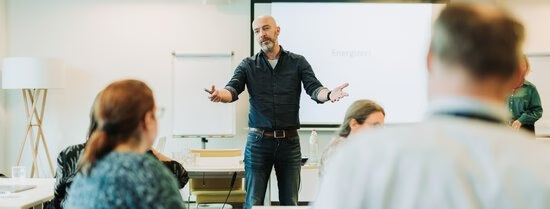Risbo regularly organizes practical workshops on specific educational issues for institutions in secondary and higher education. Joost Maarschalkerweerd, trainer and consultant at Risbo, is often involved with these trajectories. He passionately reflects on the differences between secondary and higher education, and the challenges around formative education.
"Look, every assignment Risbo takes on, gets a customized approach, no matter if that's in basic, secondary or higher education. However, the context of secondary education is often challenging and it can vary greatly. You can image that the context of a bilingual lyceum, for example, is really different from that of a MAVO."
Can you point out a difference between secondary and higher education?
"At universities we often get critical questions about theory, and whether an intervention is evidence based or research informed. In secondary education, critical questions or reactions are more likely connected to feasibility and applicability, given the high workload and often associated emotions. On the other hand, the challenges are really not that different, didactically speaking. Both teachers in secundary education as well as higher education deal with the same questions: how to ensure more interaction in my lessons, how to better motivate my students, how to differentiate or how to develop a more formative curriculum? Risbo is frequently involved to help answer those kind of questions in both secondary and higher education."
What does this mean for a trainer like yourself?
"I think it is very important that you know a little bit about what is going on in the world of secondary education. What are their day to day challenges? A trainer or consultant can know an awful lot or can be very experienced, but if you are not familiar with that world or if you lack a certain dose of (self) relativization, improvisation and humor, it will be very hard to build rapport and to get a sense of what is feasible and applicable."


What about formative teaching, or formative action?
"For decades summative testing was the norm: a curriculum was set up with a test at the end of the program. This focuses on results. In formative education, the focus is much more on growth, and working with smaller, interim tests to see whether you're on the right track. That requires a completely different behavior and way of working from the teacher - but also from the students. We see there is a growing interest in formative teaching, and can help educators to redesign their curriculum. A teacher needs to be equipped in that sense that he or she can get students to answer three main questions: what am I working for (or towards)? How am I doing now? And what will be my next step? Risbo trainers make sure to fill a teacher's backpack with ideas, tools and tips to be able to do this."
And, is that effective?
"It is indeed. Risbo works within the scientific context of the university, and the insights and theory we use are all research informed. As far as formative action is concerned, I rely on Dylan William, an absolute (scientific) authority on the subject, among others."
What kind of dynamic rises from formative practice and evaluation?
"In formative teaching, it's crucial that teacher and students speak the same language, and have the same expectations. That might seem obvious, but often it is not! At the beginning of our workshop, we often ask the following question: what makes a good student? If you ask teachers about what they think is the students' answer to that question, very different things will be said. And that sounds trivial, but if student and teacher don't speak the same language when talking about teaching, how can that teaching ever be effective and impactful? Such a conversation often forms the start of a formative teaching training."
"If student and teacher don't speak the same language when talking about teaching, how can that teaching ever be effective and impactful?"
Risbo provides various teamtrainings around didactical interventions and exercises, for example during a study day or in a customized course for a specific subject group. Joost is keen to highlight the impact of these services:
"Our strength lies in the customized approach and the fact that our training courses are designed in such a way that teachers can really get to work with that knowledge the very next day they teach. But I think it's important that people also realize that other factors play a role in the success of didactical trajectories: if a teacher has insufficient classroom management skills, for example, it will be difficult to introduce a new working method, and then the impact of your training will be minimal. So we prefer to combine training sessions with teaching visits as well. This allows us to design a training that is really complementary to what is needed for whom. In fact, a good professionalization program cannot exist without that 'field experience'."
- More information
Are you interested in a training or consult around formative practice or other didactical challenges? We'd love to think along and help you. Get in touch with Joost or send an email through our contactpage.

